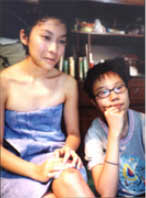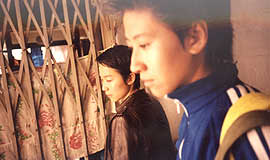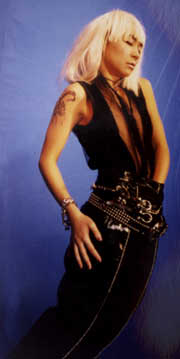
Reviewed by YTSL

Post viewing this ambitious “movie about lesbian love, pornography and social decay” (according to David Watkins of the “South China Morning Post”) which had I hadn’t felt much of a liking for, a friend (Hi there, Tara!) and I had a fun and interesting discussion about it. Over the course of doing so, she did succeed in making me think better of this evidently determinedly non-mainstream production -- or, at least, certain elements in it -- than I had upon seeing its end credits roll up on the cinema screen. At the same time, I was unable to completely shake off my suspicion that the Hong Kong Arts Development Council funded work is -- perhaps as befits its having an academic as its director, scriptwriter cum producer (Yau Ching is a media production professor at the Hong Kong Polytechnic University) -- one of those intellectually and otherwise “challenging” efforts that is meant to provide more discursive than viewing pleasure.

By a similar token, the interactions that two others of HO YUK - LET’S LOVE HONG KONG’s main characters have with Chan Kwok Chan (who, unbeknownst to such as her mother, appears as a cyber-stripper sex toy on the “Let’s Love” web site) are ones that do seem to have been effectively depicted. Nonetheless, I do feel obliged to register my reservation that the feelings for Chan Kwok Chan that odd-job-woman Zero (Erica Lam received a Golden Horse best supporting actress nomination for this) -- and not just regular “Let’s Love” patron Nicole (Colette Koo had this challenging role) -- possessed were far more akin to lust than love. As such, even when they did attempt to have personal relations with their fantasy gal, what they sought to offer her always came across as on the superficial side plus insufficient to emotionally satisfy an individual whose silence caused her to appear to be an enigma (or blank slate) to many.

In contrast, I am wont to suppose that HO YUK - LET’S LOVE HONG KONG could have done without many of the scenes in which Zero figured (or actually have done away entirely with her character); and this even while recognizing that her section of the movie is that which most clearly communicates that the Hong Kong of this offering -- one which has been diminished by, and in relation to, certain non SAR sections of Mainland China -- (still) really only exists in the imaginary. In all honesty, the segments with the giraffes felt too heavy-handed while many of the ones in the cinema-turned-lodgings too surreal. Furthermore, those which had her walking at length along under lit Mongkok area streets too often appeared overly meandering, and contributed to my sense that the 87 minute long work could have been significantly improved if only it had had a better editor along with selector of what to delete from plus add to it.
My rating for this film: 5.5
